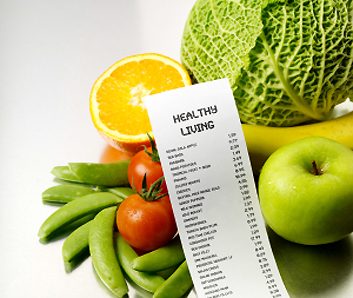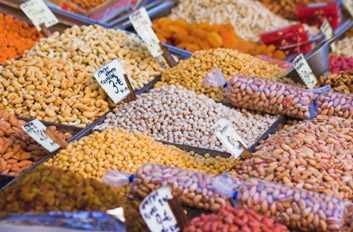
Stock up on essentials
Take into account your tastes, how often you prepare meals at home and which foods your family likes. The more choices you have on hand, the easier it will be to put together a healthy meal or snack at the drop of a hat. Use these shopping strategies to help you stock a healthy kitchen.

Have a snack before you shop
Nothing weakens willpower faster than hunger, so avoid temptation by shopping only after you’ve eaten a meal or a healthy, energy-boosting snack.

Start with a list – and stick with it
Steer your cart down almost any supermarket aisle, and you’ll be surrounded by brightly coloured packages designed to make their way into your cart. To avoid the hard sell, put together a shopping list before you leave the house, building it around recipes and meal plans.
However, you don’t have to be afraid to tinker with your meal plan if there’s a good bargain at the fish counter or something irresistible in the produce aisle; if, say, local peaches or tomatoes are in season, help yourself. But don’t reach for that enormous bag of cheddar popcorn just because it’s on sale this week.

Steer your cart around the outside
In most grocery stores, the healthiest choices are arranged around the perimeter of the store. That’s where you’ll find dairy products, produce, meat and fish. As a general rule, then, the more shopping you do around the edges, the less processed, calorie-laden food you’re likely to run across.

Bigger is not always better
Giant food warehouses let you save money by buying in bulk, and that can be helpful. But you should only take advantage of those deals if they’re on healthy items that fit your diet.
If you really want to buy jumbo-sized bags of snacks to save money, just divide them into single-serving bags as soon as you get home.

Read the fine print
When your goal is to lose weight, the most important number on a product’s nutritional label is calories per serving – but check how much one serving actually is. Some cereal boxes list 3/4 cup, for example, while others use 1 cup. Some foods may look as if they’re low in calories – until you discover that a serving size would probably fit in a thimble. Be realistic about how much you would eat.

Keep treats at a distance
To ensure that treats remain just that, don’t buy them at the grocery store. Either bake them yourself or make them part of a special occasion or family outing. When the family wants ice cream, for example, go to your local ice cream parlour. Decide in advance how much you’ll have; one small bite of everyone else’s ice cream will let you sample a bunch of flavours and still keep you within the recommended serving size for dessert.
Related:
• 19 foods for a healthy pantry
• How to stock a healthy pantry
• 10 time-saving food prep ideas for healthy eating
